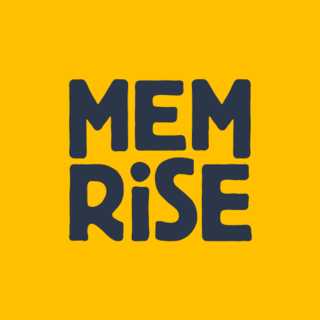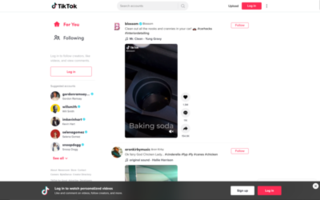Related Research Articles

Gengo was a web-based translation platform headquartered in Tokyo.
Artificial intelligence and music (AIM) is a common subject in the International Computer Music Conference, the Computing Society Conference and the International Joint Conference on Artificial Intelligence. The first International Computer Music Conference (ICMC) was held in 1974 at Michigan State University. Current research includes the application of AI in music composition, performance, theory and digital sound processing.
Musixmatch is an Italian music data company and platform for users to search and share song lyrics with translations. It is the largest platform of its kind in the world, having 80 million users, 8M lyrics and 130+ employees.

Memrise is a British language platform that uses spaced repetition of flashcards to increase the rate of learning, combined with a GPT3-powered "AI Language partner" that allows learners to practice human-like conversations, which Memrise believes can help learners to overcome the "confidence gap" in language acquisition. It is based in London, UK.

Stripe, Inc. is an Irish-American multinational financial services and software as a service (SaaS) company dual-headquartered in South San Francisco, California, United States and Dublin, Ireland. The company primarily offers payment-processing software and application programming interfaces for e-commerce websites and mobile applications.
Adzuna is a search engine for job advertisements. The company operates in 19 countries worldwide and the UK website aggregates job ads from several thousand sources.
Sprinklr is an American software company based in New York City that develops a SaaS customer experience management (CXM) platform. The company's software, also called Sprinklr, combines different applications for social media marketing, social advertising, content management, collaboration, employee advocacy, customer care, social media research, and social media monitoring.
Believe is a global digital music company headquartered in France. Believe has several brands including TuneCore, Nuclear Blast, Naïve, Groove Attack and AllPoints.

ByteDance Ltd. is a Chinese internet technology company headquartered in Beijing and incorporated in the Cayman Islands.

Puls is a San Francisco–based startup founded by Eyal Ronen and Itai Hirsch in 2015.

TikTok, whose mainland Chinese counterpart is Douyin, is a short-form video hosting service owned by ByteDance. It hosts user-submitted videos, which can range in duration from 3 seconds to 10 minutes.

DCM (also known as DCM Ventures) is a venture capital firm located in Silicon Valley, Tokyo and Beijing. It has approximately $4.2 billion under management. DCM was the first Silicon Valley firm to invest in the early-stage technology sector in China, beginning in 1999. Since 2019, DCM has had seven initial public offerings, which include Bill.com (NYSE: BILL), BlueCity (NASDAQ: BLCT), Freee (TYO: 4478), Life360 (ASX: 360), Sansan (TYO: 4443), UCloud (SHA: 688158), and VisasQ (TYO: 4490). DCM has over $200 billion in enterprise value.
Notion is a freemium productivity and note-taking web application developed by Notion Labs Inc. It offers organizational tools including task management, project tracking, to-do lists, and bookmarking. Additional offline features are offered by desktop and mobile applications available for Windows, macOS, Android, and iOS. Users can create custom templates, embed videos and web content, and collaborate with others in real-time.
Zhang Yiming is a Chinese internet entrepreneur. He founded ByteDance in 2012 and developed the news aggregator Toutiao and the video sharing platform TikTok (Douyin/抖音), formerly known as Musical.ly. As of October 2022, Zhang's personal wealth was estimated at US$55 billion, according to Bloomberg Billionaires Index, making him the second-richest person in China, after Zhong Shanshan. On November 4, 2021, Zhang stepped down as CEO of ByteDance, completing a leadership handover announced in May 2021.
Prequel, Inc. is an American technology company and mobile app developer known for developing the Prequel mobile application, which enables editing photos and videos with filters and effects generated using artificial intelligence. Prequel was founded in 2018 by Serge Aliseenko and Timur Khabirov, who currently serves as the company’s CEO. It is headquartered in New York City. As of August 2022, it had been downloaded more than 100 million times.
SoundOn is a music marketing and distribution platform founded in 2021 by TikTok. It mainly provides song distribution and artist services. The tool lets users upload music directly to TikTok to earn royalties, while allowing them to retain their copyright on the music. The service also distributes artists' music to other platforms. The platform provides support including audience insights and development advice.
Artifact is a personalized social news aggregator app that uses recommender systems to suggest articles. Launched in January 2023 by Nokto, Inc., a company founded by Kevin Systrom and Mike Krieger, the co-founders of Instagram, the app is available for iOS and Android. The app’s name is a portmanteau of articles, artificial intelligence and fact.
References
- ↑ "Bloomberg Business Innovators 2016". bloomberg.com. Retrieved 2023-01-03.
- 1 2 3 4 5 "Introducing the next generation of music makers". theguardian.com. Retrieved 2023-01-03.
- 1 2 3 "What Will Happen When Machines Write Songs Just as Well as Your Favorite Musician?". motherjones.com. Retrieved 2023-01-03.
- ↑ "Jukedeck's computer composes music at touch of a button". ft.com. Retrieved 2023-01-03.
- 1 2 3 "From Jingles to Pop Hits, A.I. Is Music to Some Ears". nytimes.com. Retrieved 2023-01-03.
- ↑ "Need Music For A Video? Jukedeck's AI Composer Makes Cheap, Custom Soundtracks". techcrunch.com. Retrieved 2023-01-03.
- ↑ "The AI innovators who are blazing a trail into our future". wired.co.uk. Retrieved 2023-01-03.
- 1 2 "Jukedeck wants to be your band for video soundtracks". thenextweb.com. Retrieved 2023-01-03.
- ↑ "Jukedeck: the software that writes music by itself, note by note". wired.co.uk. Retrieved 2023-01-03.
- ↑ "Robot rock: how AI singstars use machine learning to write harmonies". standard.co.uk. Retrieved 2023-01-03.
- ↑ "Meet pop's newest star: the song bot". thetimes.co.uk. Retrieved 2023-01-03.
- ↑ "TIKTOK OWNER BYTEDANCE BUYS AI MUSIC COMPANY JUKEDECK". musicbusinessworldwide.com. Retrieved 2023-01-03.
- ↑ "As TikTok's Music Licensing Reportedly Expires, Owner ByteDance Purchases AI Music Creation Startup JukeDeck". digitalmusicnews.com. Retrieved 2023-01-03.
- ↑ "An AI-generated music app is now part of the TikTok group". sea.mashable.com. Retrieved 2023-01-03.
- ↑ "Jukedeck wins Vator Splash London!". vator.tv. Retrieved 2023-01-03.
- ↑ "Automatic Music Generator Jukedeck Wins Le Web Startup Competition". techcrunch.com. Retrieved 2023-01-03.
- ↑ "Glittering spires and silicon roundabouts". bbc.co.uk. Retrieved 2023-01-03.
- ↑ "Jukedeck wins £30,000 in TechCrunch Startup Battlefield Competition". uktech.news. Retrieved 2023-01-03.
- ↑ "And The Winner Of TechCrunch Disrupt London 2015 Is… Jukedeck". techcrunch.com. Retrieved 2023-01-03.
- ↑ "The hottest tech startups of 2017 rocked London at The Europas Awards". sg.finance.yahoo.com. Retrieved 2023-01-03.
- ↑ "BIMA AWARDS SETS TONE FOR FUTURE OF DIGITAL COMMUNICATIONS". communicatemagazine.com. Retrieved 2023-01-03.